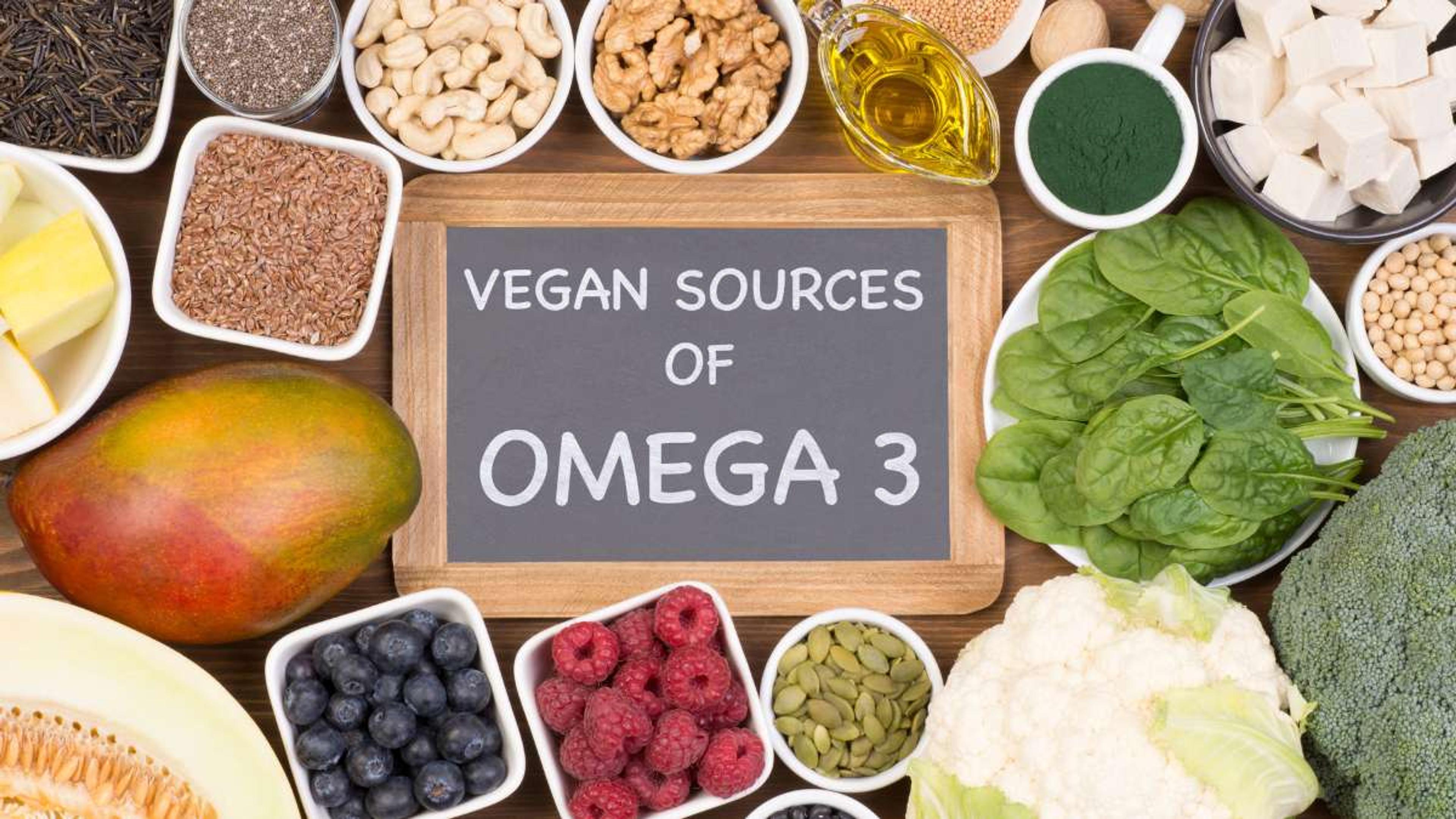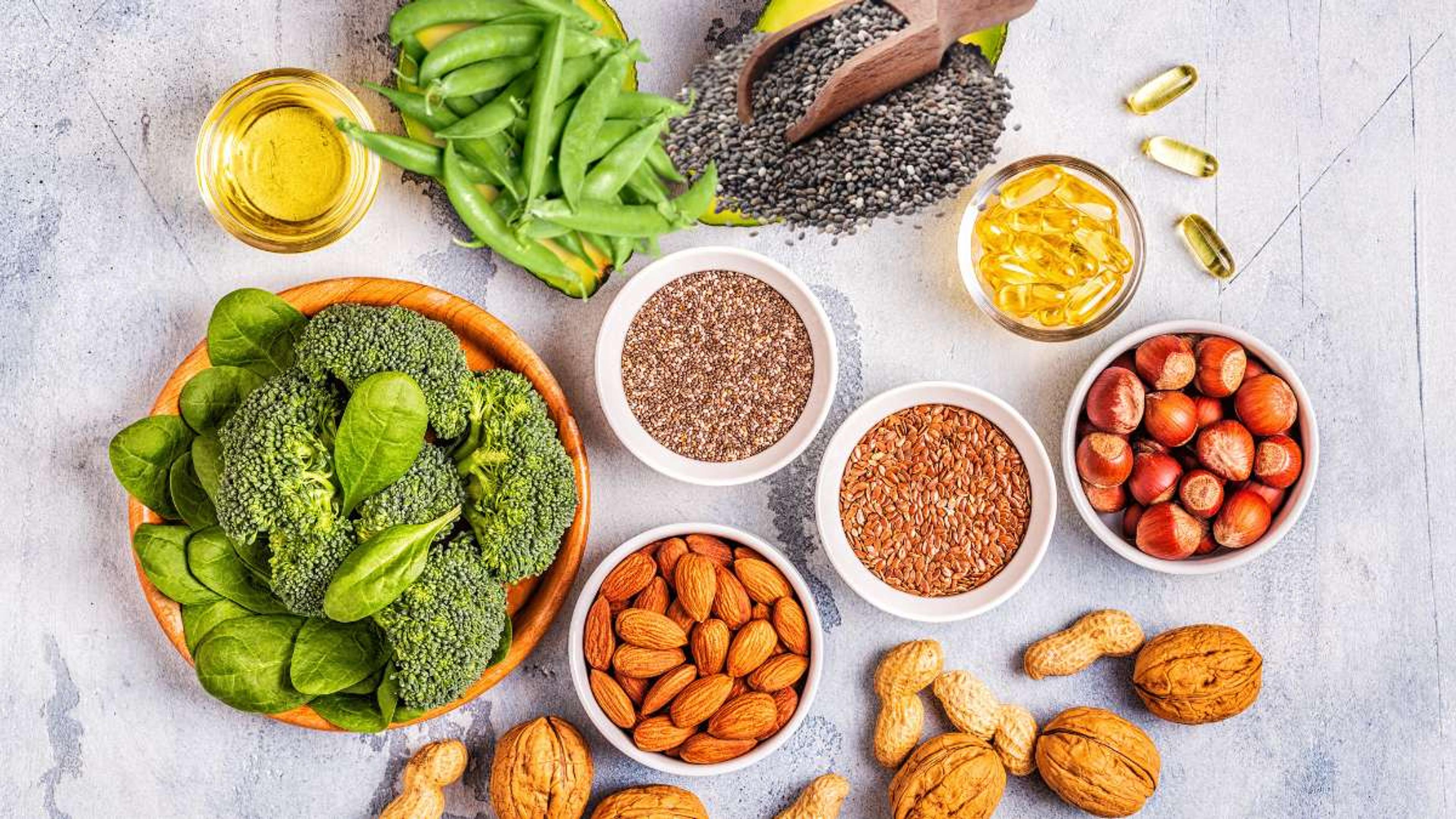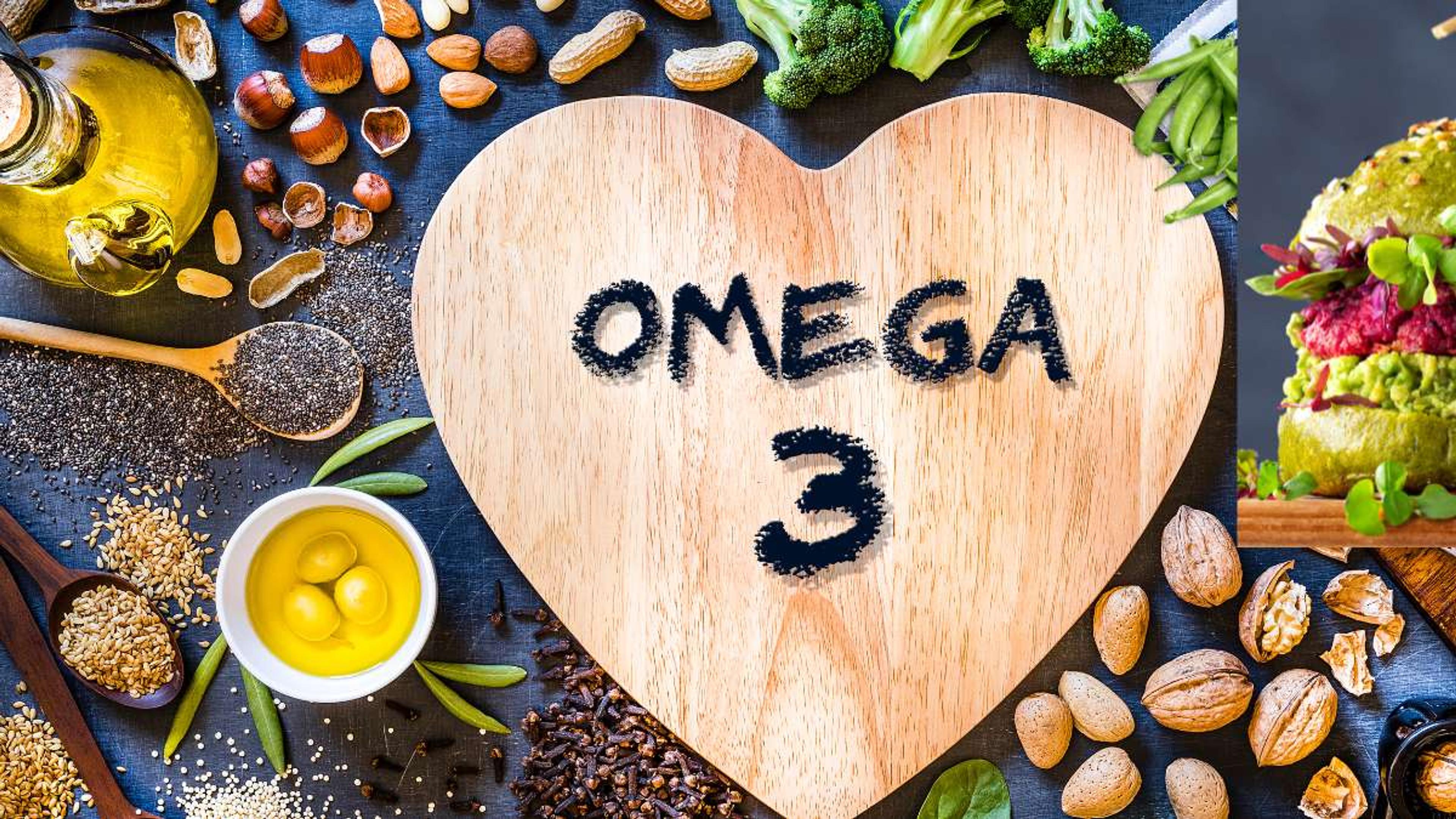Boost Your Omega-3 Intake as a Vegetarian: Tips for a Healthy Diet

- Key Takeaways
- Omega-3 Fatty Acids Explained
- 12 Omega-3 Foods for Vegetarians and Vegans
- Importance of Omega-3 fatty acids for overall health
- Incorporating Omega-3 Foods into a Vegetarian/Vegan Diet
- Conclusion
- FAQs
Are you a vegetarian or vegan wondering how to get enough Omega-3 in your diet? Omega-3 fatty acids, essential for brain and heart health, are most commonly found in fish - but don't worry, there are plenty of plant-based sources too.
This blog post will introduce you to 12 foods rich in Omega-3s that fit perfectly into a veggie diet and provide useful tips on incorporating them into your meals. Read on if you're ready to boost your health the plant-powered way!
Key Takeaways
- Vegetarians and vegans can obtain omega-3 fatty acids from various plant-based sources such as flax seeds, walnuts, chia seeds, seaweed, and hemp seeds.
- Including direct sources of EPA and DHA is important for a vegetarian or vegan diet because the body's conversion of ALA into these omega-3 fats is limited.
- Foods like edamame, kidney beans, soybeans and soybean oil are also good sources of omega-3 fatty acids for vegetarians and vegans.
- Adding canola oil to cooking or meals can provide a vegan source of omega-3s.
Omega-3 Fatty Acids Explained
Omega-3 fatty acids are essential for overall health and can be obtained through various sources, including plant-based foods that are high in polyunsaturated fats. It is important to understand the different types of omega-3 fatty acids, such as ALA, EPA, and DHA, and why direct sources of EPA and DHA are necessary in a vegetarian diet.
Understanding the different types of Omega-3 fatty acids (ALA, EPA, DHA)
Omega-3 fatty acids are a family of essential fats vital for optimal health. This family comprises three primary types: Alpha-Linolenic Acid (ALA), Eicosa Pentaenoic Acid (EPA), and Docosa Hexaenoic Acid (DHA).
Alpha-Linolenic Acid (ALA) is a type of omega-3 fatty acid that is predominantly found in plant-based sources. It is an essential fatty acid, meaning that our bodies cannot produce it on their own and must obtain it from food. ALA, being a plant-based omega-3 fatty acid, provides essential nutrition for overall health. It is known to support cardiovascular health, reduce inflammation, and while ALA can be converted into EPA and DHA in the body to some extent, the body cannot produce these aspects on its own, making it necessary to source them from our diets.
Eicosa Pentaenoic Acid (EPA) and Docosa Hexaenoic Acid (DHA), on the other hand, are found in marine sources such as fish and algae. These two omega-3 fatty acids are particularly important for brain health, heart health, and inflammation reduction. Eicosa Pentaenoic Acid (EPA) and Docosa Hexaenoic Acid (DHA) are both essential omega-3 fatty acids that play crucial roles in maintaining our overall health. While they are both found in marine sources, there are some differences between the two as they have slightly different functions within the body.
EPA is known for its anti-inflammatory properties and its ability to support cardiovascular health. It plays a vital role in reducing inflammation, which can help alleviate symptoms of conditions like arthritis and promote heart health by reducing the risk of blood clotting. It is s primarily responsible for reducing inflammation in the body. It has been linked to numerous health benefits, including supporting cardiovascular health and promoting a healthy immune system. EPA is also known to have positive effects on mood and cognitive function.
On the other hand, DHA is essential for brain health and development. It is a crucial component of brain cell membranes and plays a key role in cognitive function, memory, and overall brain health. In addition to its importance for brain function, DHA also supports eye health,
Primarily found in plant oils such as flaxseed, canola, and soybean is ALA - the most common Omega-3 fat. EPA and DHA are abundantly located in fish oil supplements, sardines, mackerel, or algae-based products designed for vegetarians not consuming seafood.
Although ALA can morph into DHA and EPA within the body, the conversion rate remains relatively low; thus supplementing with DHA-EPA from algae may be beneficial for optimal nutrition in a vegetarian or vegan diet.
The importance of including direct sources of EPA and DHA
Direct sources of EPA (eicosapentaenoic acid) and DHA (docosahexaenoic acid), vital omega-3 fatty acids, present a crucial aspect of any diet. While vegetarians and vegans largely consume alpha-linolenic acid (ALA) from chia seeds, flaxseeds or hemp seeds, our bodies can only convert a fraction of ALA into these long-chain fatty acids.
Health benefits range from bolstering heart health to improving brain function show the necessity for consistent intake. Algae stand as an excellent plant-based source packed with both EPA and DHA providing direct access to these nutrients bypassing the need for bodily conversion from ALA.
12 Omega-3 Foods for Vegetarians and Vegans
Discover the top 12 plant-based sources of omega-3 fatty acids that are essential for a vegetarian or vegan diet. From flax seeds to seaweed and chia seeds, these foods will give you the nutrients you need for optimal health.

1. Flax Seeds
Flax seeds are an excellent source of omega-3 fatty acids for vegetarians and vegans. In fact, just one tablespoon of flax seeds contains a whopping 2,350 mg of ALA omega-3 fatty acids.
These tiny seeds are also packed with other essential nutrients like fiber, protein, magnesium, and iron. Many people prefer consuming ground flaxseed over whole flaxseed as it is more commonly used in various recipes and is easier to incorporate into meals.
With their high omega-3 content and numerous health benefits, flax seeds make a fantastic addition to any vegetarian or vegan diet, especially for those who may be at risk for omega-3 deficiency.
2. Walnuts
Walnuts are a powerhouse when it comes to omega-3 fatty acids, packing in an impressive 2.6 grams of these essential fats in just one ounce. With about 65% fat by weight, walnuts provide a good source of plant-based fats and protein, making them an excellent choice for vegetarians and vegans who want to incorporate more plant foods into their diet.
They offer a suitable alternative for those who don't consume fish or fish oil for omega-3 supplementation. Adding walnuts to your plant-based diet is an easy and delicious way to increase your intake of these important nutrients without compromising your dietary choices.
3. Seaweed and Algae
Seaweed and algae are excellent sources of omega-3 fatty acids for vegetarians and vegans. They are the only plant-based sources that provide DHA and EPA, two crucial omega-3 fats.
Seaweed can be easily incorporated into a diet by using it in sushi or adding it as an ingredient in various dishes. Algae, such as spirulina, nori, and chlorella, are also rich in omega-3 fatty acids.
By increasing their intake of seaweed and algae, vegans can ensure they meet their requirement for essential omega-3 fats.
4. Chia Seeds
Chia seeds are an excellent addition to a vegetarian or vegan diet, as they are packed with omega-3 fatty acids. In fact, chia seeds are the richest plant source of these essential fats.
Omega-3s are important for brain health, heart health, and overall well-being. Chia seeds also provide other nutritional benefits such as being a complete protein containing all nine essential amino acids, and offering a good amount of fiber and calcium.
Including chia seeds in your meals is a simple way to boost your omega-3 intake and support optimal health.
5. Hemp Seeds
Hemp seeds are a great source of omega-3 fatty acids for vegetarians and vegans. Just 3 tablespoons of hemp seeds provide a whopping 2.6 grams of alpha-linolenic acid (ALA), making them an excellent choice for those looking to increase their intake of vegan omega-3s.
Not only do hemp seeds contain essential fats, but they are also packed with other beneficial nutrients such as iron, zinc, and magnesium. Many people consider hemp to be one of the best plant-based sources for obtaining omega-3 fatty acids, making it a valuable addition to any vegetarian or vegan diet.
In addition to being rich in omega-3s, hemp seeds have a pleasant nutty flavor that can enhance the taste of various dishes. They can be easily incorporated into your meals by sprinkling them on top of salads or adding them to smoothies and granola.
6. Edamame
Edamame is a fantastic plant-based source of omega-3 fatty acids for vegetarians and vegans. This young soybean not only provides omega-3s but also delivers vegetable protein, fiber, essential vitamins, and minerals.
Including edamame in your diet can help you meet your daily omega-3 needs while reaping the numerous health benefits associated with these essential nutrients.
7. Kidney Beans
Kidney beans are a valuable source of omega-3 fatty acids for vegetarians and vegans. With half a cup of kidney beans containing 0.10 grams of omega-3s, they provide an excellent opportunity to meet your dietary needs.
Not only that, but kidney beans also offer plant protein and fiber, which can help keep you feeling full until your next meal. By incorporating kidney beans into your vegetarian or vegan diet, you can enjoy the health benefits of omega-3 fatty acids while enjoying a delicious and nutritious food option.
8. Soybeans & Soybean oil
Soybeans and soybean oil are excellent sources of omega-3 fatty acids for vegetarians and vegans. They provide a variety of essential nutrients, including complete protein, B vitamins, and some omega-3s.
Soy-based products like tofu and tempeh are versatile options that can be incorporated into a well-balanced diet. In addition to their high protein content, they also contain iron, calcium, and 12-20 grams of protein per serving.
Including soy in your vegetarian or vegan eating pattern can help ensure you meet your nutritional needs while enjoying the health benefits of omega-3 fatty acids.
9. Purslane
Purslane is a leafy green vegetable that is rich in omega-3 fatty acids, making it an excellent choice for vegetarians and vegans. Want to discover more about this nutritious plant and how to incorporate it into your diet? Keep reading!
10. Brussels Sprouts
Brussels sprouts, although not often mentioned in discussions about omega-3 foods, are actually a good source of this essential fatty acid. These mini cabbages contain alpha-linolenic acid (ALA), which is an important type of omega-3.
ALA is converted by the body into EPA and DHA, the other two main types of omega-3s. Including Brussels sprouts in your vegetarian or vegan diet can help provide you with these beneficial fatty acids.
So next time you're planning a meal, consider adding some roasted or steamed Brussels sprouts to boost your omega-3 intake.
11. Wheat Germ
Wheat germ is a valuable source of omega-3 fatty acids for vegetarians and vegans. It contains alpha-linolenic acid (ALA), an essential omega-3 that the body cannot produce on its own.
Including wheat germ in your diet can help meet your dietary needs and promote heart-healthy nutrition. By adding this nutrient-rich ingredient to your meals, you can ensure you're getting enough omega-3s while following a plant-based lifestyle.
12. Canola Oil
Canola oil is a vegan source of omega-3 fatty acids, making it a good option for vegetarians and vegans to obtain this essential nutrient. In fact, one tablespoon of canola oil contains 1.28 grams of omega-3 alpha-linolenic acid (ALA).
This makes canola oil an excellent dietary source of omega-3 for those who have limited access to other sources like fish or seafood. By incorporating canola oil into your cooking and meal preparation, you can easily add omega-3 fatty acids to your diet and enjoy the health benefits they offer.
Importance of Omega-3 fatty acids for overall health
Omega-3 fatty acids are vital for maintaining optimal health. These healthy fats play a crucial role in various cellular functions and support multiple organs, including the heart, brain, kidneys, and eyes.
They help lower triglycerides in our body contributing to healthier blood lipid profiles. Beyond cardiovascular benefits, Omega-3s also contribute significantly to cognitive function and brain health.
A consistent intake of this essential nutrient aids in preventing chronic diseases such as Alzheimer's disease by providing neuroprotective qualities. Body inflammation is another area where Omega-3 can have an impact; it counters inflammatory responses thus potentially reducing the risk of illnesses linked to high inflammation levels like arthritis or asthma.
Overall, integrating a sufficient quantity of Omega-3 fatty acids into one's diet ensures better physical health due to its varied beneficial effects on different body systems.
Incorporating Omega-3 Foods into a Vegetarian/Vegan Diet
To incorporate omega-3 foods into a vegetarian/vegan diet, individuals can consume fortified foods and beverages, take omega-3 supplements, balance omega-3 and omega-6 ratios, and follow cooking and preparation tips.

Fortified foods and beverages
Fortified foods and beverages play a crucial role in meeting the nutritional needs of vegetarians and vegans. These specially fortified products, such as soy-based beverages and fortified veggie "meats," are enriched with essential nutrients like vitamin B12 that are typically lacking in plant-based diets.
But it doesn't stop there – these fortified options also offer an opportunity to boost omega-3 fatty acid intake for those who don't consume fish or seafood. By incorporating these fortified foods and beverages into their diet, vegetarians and vegans can ensure they're getting the necessary nutrients, including omega-3s, without the need for fish oil supplements.
Omega-3 supplements
Omega-3 supplements are a convenient option for vegetarians and vegans who may struggle to get enough omega-3 fatty acids from their diet alone. While plant-based sources like flax seeds and chia seeds provide omega-3s, they mainly contain alpha-linolenic acid (ALA), which the body needs to convert into EPA and DHA.
However, this conversion is not always efficient. Omega-3 supplements can help ensure that you're meeting your recommended intake of these essential fatty acids without relying solely on plant-based sources.
It's important to note that while algae-based supplements are available for both EPA and DHA, there isn't enough evidence to support the need for long-chain omega-3 supplements specifically for vegetarians and vegans.
Balancing Omega-3 and Omega-6 Ratios
Maintaining a proper balance between Omega-3 and Omega-6 fats is crucial for optimal health. The ideal ratio is 1:1, but unfortunately, most people have a ratio of 1:20 due to the abundance of Omega-6 fats in processed foods.
Balancing these ratios is important because both types of fats play different roles in the body. While Omega-3s help reduce inflammation and promote heart health, too much Omega-6 can lead to inflammation and increase the risk of chronic diseases.
To achieve a better balance, it's essential to include more Omega-3 sources like flax seeds, walnuts, chia seeds, seaweed, and hemp seeds in your diet while reducing intake of processed foods high in Omega-6 oils such as corn oil or sunflower oil.
Cooking and Preparation Tips
Incorporating omega-3 foods into a vegetarian or vegan diet can be made easier with some cooking and preparation tips. One tip is to regularly include sources of ALA (alpha-linolenic acid) such as flax seeds, chia seeds, and hemp seeds in your meals.
These can be added to smoothies, oatmeal, granola, or used as toppings for salads. Another tip is to experiment with seaweed and algae, which are great sources of EPA (eicosapentaenoic acid) and DHA (docosahexaenoic acid).
They can be incorporated into dishes like sushi rolls or stirred into soups. Additionally, you can use plant-based oils like flaxseed oil or canola oil when cooking to add more omega-3s to your meals.
To ensure you're getting enough omega-3s from your vegetarian or vegan diet, it's important to balance the ratio between omega-3 and omega-6 fatty acids. Omega-6 fatty acids are found in many vegetable oils and processed foods, so minimizing their intake while increasing consumption of omega-3-rich foods will help maintain a healthy balance.
Conclusion
In conclusion, vegetarians and vegans can easily meet their omega-3 needs by incorporating a variety of plant-based sources into their diet. Foods like flaxseeds, walnuts, chia seeds, and seaweed are all excellent options.
Additionally, fortified foods and supplements can also be helpful in ensuring adequate omega-3 intake. With these tips and knowledge about omega-3 rich foods, vegetarians and vegans can enjoy the numerous health benefits that come with this essential nutrient.
FAQs
1. Can vegetarians and vegans get enough omega-3 from plant-based sources?
Yes, vegetarians and vegans can obtain sufficient omega-3 fatty acids from plant-based sources such as chia seeds, flaxseeds, walnuts, hemp seeds, and algae-based supplements.
2. How much omega-3 should vegetarians and vegans consume daily?
The recommended daily intake of omega-3 fatty acids for adults is 250-500 mg per day. However, specific needs may vary depending on factors such as age, gender, and overall health.
3. Are there any risks or side effects associated with consuming omega-3 from plant-based sources?
There are no known significant risks or side effects associated with obtaining omega-3 from plant-based sources. However, it is important to maintain a balanced diet and consult with a healthcare professional if you have any specific concerns or medical conditions.
4. What are some tips for incorporating more omega-376c_41ghs in a vegetarian or vegan diet?
Some tips for increasing your intake of omega- 376c_41ghs in a vegetarian or vegan diet include adding ground flaxseeds to smoothies or oatmeal, using chia seeds as an egg substitute in baking recipes, including walnuts in salads or snacks, and considering supplementation with algae oil capsules for an additional source of omega - 376b_7tgadjaix.

